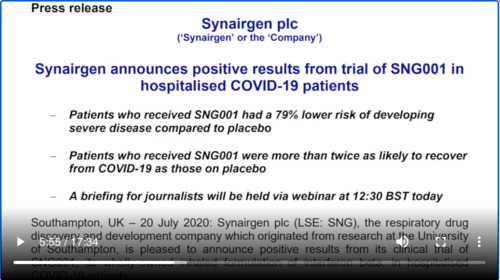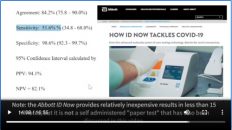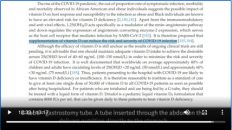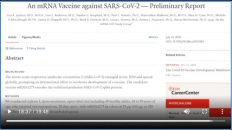Update 100: Interferon Beta COVID-19 Treatment and a Retrospective
Medcram.com wasn’t another medcram video and is turns out the 100th update on covid-19. We started doing coronavirus updates in late January. And here we are about six months later. So today we’re going to update you on what is going on in the world of covid-19. We’re going to do a little retrospective and we’ll have a little something different at the end first. Let’s look at the numbers.
So in the United States daily new cases have gone up and reached a high Plateau daily deaths in the United States were decreasing until early July and those seem to be picking up in California daily new cases continue to rise as do the daily deaths here in California, and I can tell you I work in both San Bernardino and Riverside counties in Southern California, and we have definitely noticed an
Is in the hospitalizations for covid-19.
Where’s you look at New York and daily new cases seem to have been kept successfully at a minimum.
If we look at cases around the world Brazil is certainly up there and their daily new cases are increasing.
And the number of new deaths in Brazil on a daily basis is steadily at a constant beat and we can see some of the other countries that meet that list at the top in addition to the United States and Brazil. We also have India Russia South Africa Mexico and Peru in terms of treatment for covid-19. There’s been a new treatment that has been released terms of press release and has been picked up by a number of
In seas and this is interferon beta and it’s inhaled form. This medication has been around for some period of time. It’s a known medication that can help with the immune system and it’s been looked at in asthma for some period of time in terms of helping asthmatics fight infections. And this New York Times article kind of gets into the basic components of what’s going on here as we’ve talked about before in a number of our videos and updates that
that it seems as though this virus tends to suppress the body’s immune system at least at the beginning and they note that here in this article. They say here that scientists have found that the coronavirus attacks the body in part by blocking its natural interferon response disarming cells that would otherwise be alerting neighboring cells to activate their own genes and fortify themselves against the invading virus and they’re saying here that administering this interferon to patients would invigorate
Fences in the early stages of the illness. So the company that makes this has done a study that they registered as you’re supposed to do on a clinical website and they have just released some of the results of that research and as a publicly traded company the stock rules in the UK require them to release the data on this, but we don’t have a peer-reviewed or even a preprint of the data at this point and when that becomes available
Double will certainly pass that along to you. But let’s at least see what they are saying at this point about this medication interferon.
So in this study, they took 101 patients and they randomize them to this interferon treatment that is nebulized or diffused into the air as they breathe it in till the nebulizer treatment and their code name for this was s Angie oo1 versus placebo. And so they randomize these patients to either this inhaler or the placebo and according to the press release.
They looked at discharged from the hospital the average time to discharge in the intervention group was six days and then the placebo group it was nine days when they looked at the odds of recovery at 28 days. They found that those in the intervention group had a 3.86 times odds of recovery at
Days, then the placebo when they looked at the odds of either death or ending up on the ventilator. They found that there was only one-fifth as compared to Placebo. And then finally they looked at the odds of complete recovery. That means no viral symptoms at all afterwards. No long haulers. No nothing. So what was the odds of complete recovery and they found that in the intervention group?
And there was two point one nine times the odds versus placebo and when they looked at the P values for these the p-value for this one here was 0.017. This one was 0.046. And this one was 0.007. So these are all statistically significant.
We have the press release here which will link to in the description section below including the key findings and exactly who these professors are. Also if you’d like some balance reaction in terms of experts talking about some of the shortcomings of this announcement will also link to that here. This is the science media center.org and some of the expert opinions that have looked at this release and have some
questions about it as well. I think before it is ready for prime time. We’re going to need to see peer-reviewed Journal articles and probably a larger randomized controlled trial since this one only had about a hundred subjects. So over the last few months, we’ve released a hundred updates. And what I like to do is go over those and pick out what I think are videos that really talk about pivot Points. Okay. We’re on a virus.
Number one. That’s what we talked about. What our RNA virus was talked about the common cold we talked about how it comes from animals and that we think that there may be some close contact going on somehow. I think historians will be looking back at not only these medcram updates but a lot of the videos that other people have posted to document what happened what people were thinking during this time. It’s also great to read a lot of your comments on these videos, especially over.
Time and as time has changed things. I think one of my favorite sets of updates is 46 and 47 because we really get into the molecular biology we get into the immune system where we’ve talked about before how the innate immune system is crippled in this coronavirus and we talked about a paper that was published out of a center of excellence in Indonesia that looked at SARS 1 and merge
Is and compared it to SARS to and the came up with the fact that the innate immune system particularly was going to be crippled and that’s exactly what we’re seeing. Now with this emergence of beta interferon potentially working. Well that led us down the whole idea of how do we enhance our immune system in this situation? So we’re not held under the spell as it were of covid-19 and a suppressed immune system and that led us to looking at immune.
Yoon enhancing objects and one of those things was sleep. We also talked about a number of things one of those things that we looked at was human monocyte stimulation by experimental whole body hyperthermia, and we reflected back on the Nobel Prize in medicine winner in 1927. And that was Julius Wagner your egg who basically infected patients on purpose with malaria so that he could increase their temperature in this seem to cure his
Patients of neurosyphilis. We started looking at some of the data with hydrothermal therapy.
Also started looking at some of the Nordic countries that do this on a regular basis with sauna bathing and looked at some of the data. They’re related to that and some interesting data showing that all cause mortality improved with frequency of sauna bathing on a weekly bi-weekly. Try weekly basis.
Another favorite as I mentioned was update 47 where we started looking at what they were doing prior to drug randomized controlled trials as we said back in the 1920s and even before and specifically during the epidemic of 1918 1919 with the flu. And so we at medcram proposed. Is there something that we could do between when we get the virus at home and when we show up to the hospital with symptoms of covid-19 shortness of breath hypoxia.
There seems to be about a seven day period of time there between those two periods where maybe there is an opportunity to intervene and to prevent this from progressing. I still think that a forward-thinking scientists could come up with a nice study to test this hypothesis to see if there’s something that we could do something that is widely available inexpensive Universal that you wouldn’t need a test for that could reduce your chances of having to go.
Go to the hospital and fortunately I’m aware of several different centers across the country. Now that are investigating this very question. The next update that I thought was really practical and I loved to share it with as many people as I could is update 59 and basically it was what am I doing? Practically right now with the knowledge that I have and trying to share what am I doing for? Me and my family to protect me as much as I possibly can from covid-19.
Teen and this is pertinent because I’m a critical care intensivist. I’m walking in and out of patient’s rooms all the time, which are known to have covid-19. And so what am I doing to prevent that from myself getting infected and also infecting my family members Etc. And so I love this because I can just send this video to people who ask me. Well, what are you doing? And I can go through what I am doing why I’m doing it. We even got into the routine that I do when I go to work.
Work and come back home to make sure that I don’t take coronavirus home with me and into the house.
Medcram 63 is got to be one of my favorites as well after we started to hear that thromboses was a big problem with covid-19. We started looking at why that was the case. We started to see that there was thrombosis and autopsies that there were platelet-rich that there was quite a bit of Von Willebrand factor that was being expressed and we started connecting the dots and update 63 did quite a bit of that looking at oxidative stress and why patients are
Being admitted to the hospital with covid-19 Have hibm Eyes diabetes cardiovascular disease renal problems. These are not the patients that we thought that would be ending up in the hospital. No rather and we thought these patients that would be ending up in the hospital would be patients with lung disease or asthma that turns out not to be the case as much as we used to think and so what we do is we put together an understanding about what it is that we thought was going on.
Medcram update 65 and 66 connected those dots in terms of papers that we pulled out and looked at those things in vitro. We found that covid-19 is the trifecta when it comes to increasing superoxide species and reactive oxygen species both by what it does to Angiotensin II and also by Angiotensin 1 7 also by recruiting white blood cells that secrete superoxide.
in medcram update 66 we developed that a little bit more looked at ACE inhibitors a Arby’s and really set the stage for what we believe is going on and why oxidative stress is so important to understand when you’re talking about who is susceptible to getting covid-19 and I gotta say one of my favorite updates is medcram 98 and this is where we took a look at this idea about
out adequate testing Which is far cheaper than the testing that we currently have and is far faster and probably more Universal potentially to do so much better than what we currently have with our testing and this idea has been spawned by dr. Michael Mina out of the Harvard School of Public Health. And again, I want to thank this week in biology for picking up this idea and running with it medcram was sort of amplifier to that but I’m happy to say that we’ve been
Unable to get dr. Michael Mina on with us in the first week of August. And so we’ll be interviewing him. So stay tuned for that because I think this idea really needs to get a lot more attention and has the ability to really change the thinking about what we need to do to get this country moving again and opening up in a logical way.
So there we are there is a small snippet of the almost 100 updates that we’ve done in the past. So tell us which ones were your favorite a number of healthcare providers went to our website medcram.com and took our free ventilator educational course, which is open to anyone who wants to do that. There is continuing medical education credit there is maintenance of certification credit. So I promise you something different here at the end of our
Earth episode, so I’m going to tell you something a little bit more about me than you might already know and I don’t want to seem like this one-dimensional person like I’m a physician and all I talk about is Coronavirus all day long because I have so many other interests one of those interests that I really really love is music. I happen to play several instruments and my favorite composer of all time hands down is Johann Sebastian Bach so you can just imagine my
Ugly when I came across this. So this is a video of Joshua Bell who’s a world-famous violinist. He decided to team up in synchrony with a number of other health care providers. He’s not a health care provider himself. He’s a world-famous violinist, but these are health care providers that are taking care of patients covid patients and they’re playing the famous Bach double violent.
Certo
as you can see in the video, there’s a number of healthcare providers and they are highlighted as they get to their part in the piece and it really highlights for me a number of things number one that we’re a team of many and even when we’re taking care of patients in the hospital. It’s a team effort that does that and I think that’s embodied in this piece of music that Bach does so well at interweaving the melody and the harmony that
We do we do as a team and that is shown here with the bach double Violin Concerto.
The other thing that I’m going to do is yes, I’m going to go ahead and link to a pretty old video. It’s about 10 years old now of me playing the Bach Toccata and Fugue in D Minor on an organ in France at the nonce Cathedral and what is Bittersweet about this is that this organ has just been destroyed by a fire just a couple of weeks ago in Nantes France the Bittersweet thing.
As well is that this Cathedral while it was relatively Untouched by the fire? The organ unfortunately was completely destroyed. The one part that I’m quite interested in. Of course is that part of this cathedral was designed by one of my ancestors many hundreds of years ago who was an architect. And so this was a big highlight that the time was to be able to play on this organ from 1611 in a cathedral that was
was started to be built back in the 14 1500 s the other gentleman there that’s with me is my brother who is helping me turn pages and also navigate the many stops on this huge organ. So I’ll leave a link to that and now you’ll know a little bit more about me and my interests we’ve had a hundred updates and I don’t know how many more updates will do hopefully coronavirus simmers down but so long as there is a development we will
We’ll have an update. Thanks for joining us.





Add comment